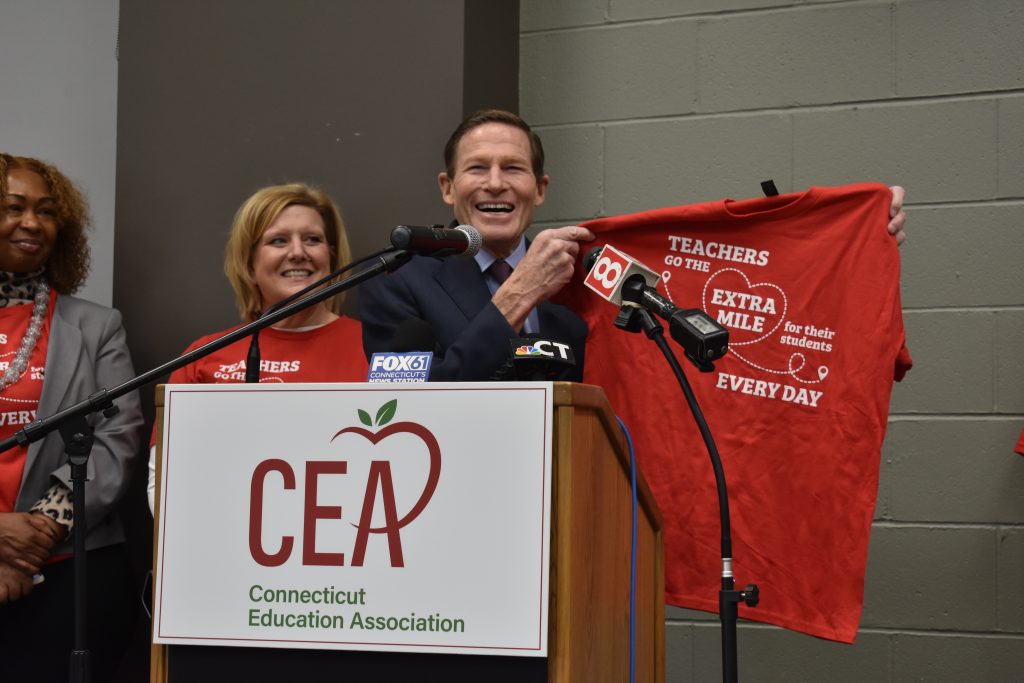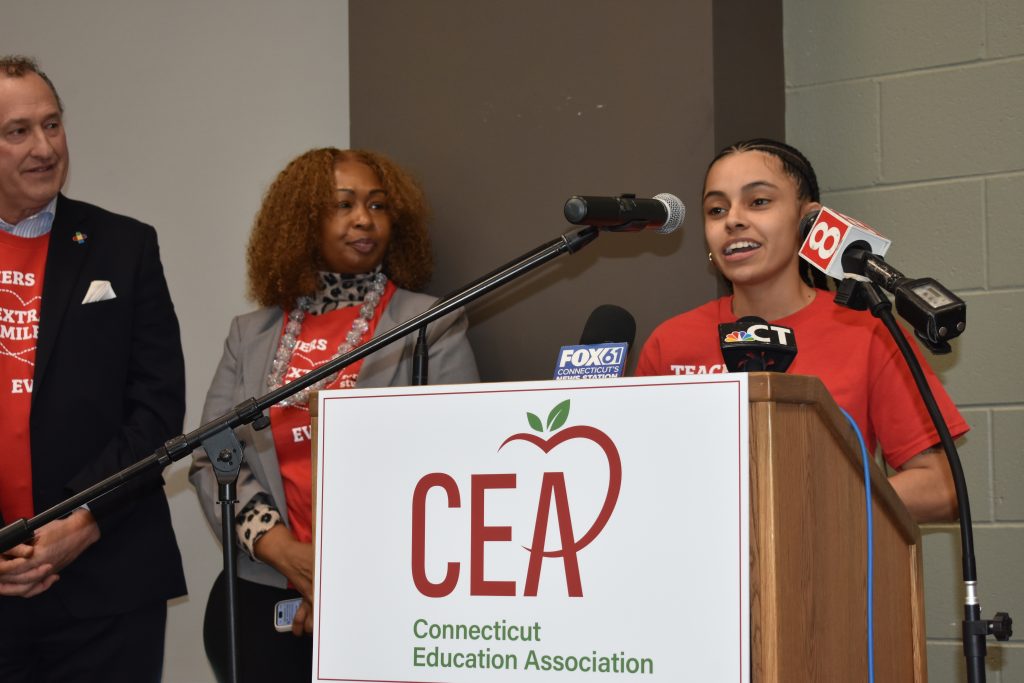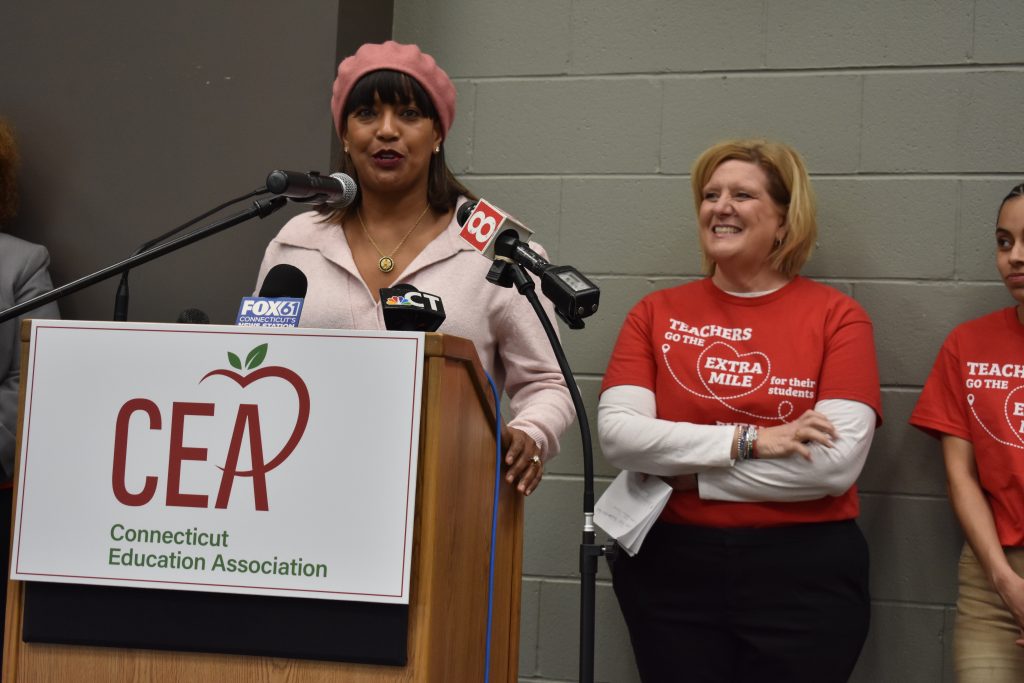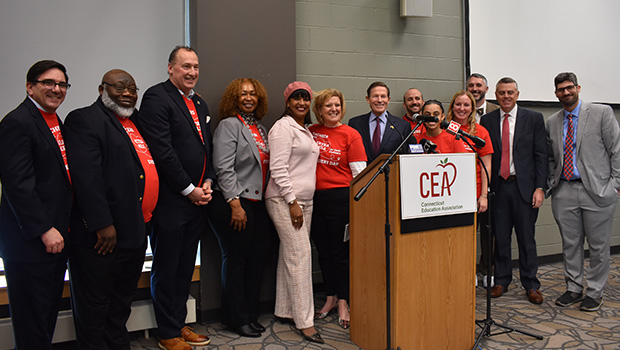“When you cut programs that enrich education to give tax breaks to the wealthy, who is left holding the bag? Our students.”
That, said U.S. Senator Richard Blumenthal at a CEA press conference today, is the potential fallout from spending cuts under a Trump administration plan.
Connecticut’s public schools, serving more than half a million students, could lose $321 million in federal funding, said Blumenthal—a move that U.S. Congresswoman Jahana Hayes likened to “taking a sledgehammer to programs without even understanding what they are.”
Hayes and Blumenthal were among several speakers at Manchester High School this morning, where CEA President Kate Dias also welcomed State Representatives Patrick Biggins, Jason Doucette, and Geoff Luxenberg, and Manchester Mayor Jay Moran, as well as educators, administrators, parents, and members of the Manchester board of education.

U.S. Senator Richard Blumenthal applauds Connecticut’s public school teachers.
“Investments in our children’s future are where we are looking to pilfer money for our budget?” asked Hayes. “That’s unconscionable. We’re not talking about line items in a budget. We’re talking about the school nurse who covers three buildings. We’re talking about the behavioral therapist and the school social worker who run afterschool programs. Many people truly don’t understand what teachers do, what happens in our schools, or what the U.S. Department of Education does. They believe the Department of Education decides what curriculum is being taught, methods of instruction, and materials used—which it does not. What the department does control is equal rights protections for our students, including special education services and training for the teachers who stand in front of our children. Once you get it—once you understand what it looks like for your children and your community—we’re having a different conversation.”
“We’ve seen a crisis in education post-COVID,” said Blumenthal. “Now is exactly the wrong time to be cutting federal support on the backs of children, families, and teachers. We should be beefing up that investment instead of dismantling the U.S. Department of Education, gutting funding, eliminating essential programs, and laying waste to our public schools.”
It’s personal

Manchester parent and teacher Jaelean Pallet describes how her children have flourished in Head Start.
Parents and teachers of Manchester students who benefit from Head Start and special education described the incredible strides their children have made under federally funded programs whose defunding, Dias said, would be an extraordinary loss.
Parent Darlene Westerman, whose ninth-grader has multiple disabilities, recalls being told her daughter would never walk or feed herself—both of which she can do “because of the school system and education she received,” Westerman said. The expertise of the special education instructors, paraprofessionals, physical and occupational therapists, and speech-language pathologists have been paramount in assisting her with her cognitive and physical disabilities.”
“We get just under $6.8 million in federal funding, which is critical and helps support children with disabilities,” said Manchester Superintendent of Schools Matt Geary. “Any cuts or redeployment of those funds to vouchers for private schools—where support for students like these doesn’t exist—would be devastating. And the continued uncertainty around that funding is doing great damage as well. Our students need to feel valued, seen, and understood, and that’s what this funding is for.”
“Federal title grants are essential to ensuring every child, regardless of ZIP code, background, or learning ability, has access to high-quality education,” said Manchester Board of Education Chair Tracy Patterson. “Title grants are the backbone of equity in education, and stripping title funding means cutting reading tutors, reducing supports for multilingual learners, cutting back on teacher training, and having fewer resources in the classrooms that need it the most. Here in Manchester it means six reading consultants, eight reading tutors, three teachers, one coordinator for English learners, two assistant principals, three behavior techs, and one director of teaching and learning. When we invest in our children, we invest in our collective future, and that’s why I’m honored to be here rocking the red.”

“Everything that I am is because of public schools,” says Congresswoman Jahana Hayes ahead of her return to D.C. to continue fighting for federal education funding.
“I thank CEA, the parents, and the teachers who get it and who are using their agency and their advocacy for the people who don’t have anyone else to stand up for them, for the children who—but for their public schools—would not get these services anywhere else,” said Hayes. “We have kids who, literally, their best meals happen in this school, not only during the school day but in afterschool programs and summer programs. Until you’ve walked a day in the shoes of the people in this room and have truly looked into the face of a child depending on public education to save their lives, I would reserve comment. This is painful for me, because every child that we’re talking about today was me. Every chance that I have right now was because I had teachers and a school who gave a damn about me and breathed life into me until I could stand on my own. Everything that I am is because of public schools. For us to close that door and choose not to invest in the future of our children is a defining moment for who we are as a country. We need to change course.”
Join the fight
With many school districts already struggling to provide the resources students need to be successful, funding cuts would create further risks for programs that support low-income students, early childhood education, children with disabilities, and more.

Social studies teacher Jake Skrzypiec’s students listen to plans to protect equitable access to education.
“These cuts are devastating for our students, their families, and our entire education system,” said CEA President Kate Dias. “They disproportionately affect those who need the most help and already face the greatest challenges—students in our poorest communities, those with the greatest needs, and young learners entering the education system in Head Start programs. Without these vital programs, we risk leaving behind a generation of students.”
As part of its advocacy efforts, CEA is encouraging everyone—students, parents, administrators, lawmakers, and community members—to participate in the Champions for Public Education Day of Action on March 4, by wearing red to show support for our schools and the need to protect essential education funding.
“Stand with us, shoulder to shoulder, wearing red for ed,” said Dias. “Now is the time to raise our voices, demand action from our leaders, and fight for the future our children deserve.”







